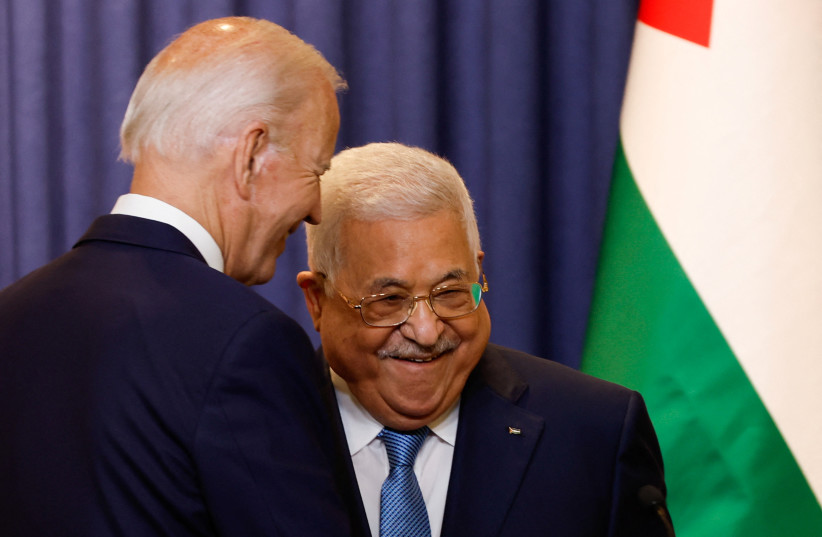Palestinian Authority President Mahmoud Abbas’s statements after his meeting on Friday with US President Joe Biden appeared to be directed mostly to the Palestinian public. That’s why the PA leadership chose to highlight the positive aspects of the meeting.
It was important for Abbas to send a message to his people that he remains fully committed to the demands and aspirations of the Palestinians, especially those who urged him to cancel the meeting to protest the Biden administration’s “bias” in favor of Israel.
Abbas’s harsh criticism of Israel is also seen as part of an effort to placate his critics and refute charges that the Palestinian leadership is in cahoots with the Israelis.
Land swapping
In his speech, Abbas stressed the need to “end Israeli occupation of the land of the State of Palestine, with east Jerusalem as its capital, on the 1967 borders.”

He did not, however, mention the idea of a land swap with Israel. In the past, Abbas was quoted as saying that the Palestinians do not rule out the possibility of swapping land, “equal in quality and value,” with the Jewish state.
Biden, by contrast, did raise the issue of land swaps in his speech. Reiterating his commitment to the two-state solution, he said: “Two states along the 1967 lines with mutually-agreed land swaps, remains the best way to achieve equal measures of security, prosperity, freedom and democracy for the Palestinians as well as Israelis.”
Shireen Abu Akleh
In his remarks, Abbas demonstrated that he is not oblivious to the anti-Israel sentiments of the Palestinian public. That’s why he repeated charges that Israel is practicing “racial discrimination” and “apartheid” against the Palestinians. That’s also why it was important for the PA president to mention the case of slain Al-Jazeera journalist Shireen Abu Akleh and call for the “perpetrators to be held accountable.”
On the eve of Biden’s visit to Bethlehem, large posters featuring Abu Akleh and depicting Israel as an apartheid state appeared in several parts of the city.
On the other hand, Abbas did not repeat his threat to walk away from the agreements signed between the PLO and Israel. Instead, he left the door open for reviving the stalled peace process, saying that he extends his hand for peace based on United Nations resolutions and the 2002 Arab Peace Initiative.
But in a clear attempt to stave off criticism from his political rivals for expressing readiness to return to the negotiating table, Abbas was keen to emphasize that “only if Israel ends its occupation of the territories of the State of Palestine, including east Jerusalem, will it be accepted into the region to live in peace and security with its countries and peoples.”
Normalization with Israel
THESE WORDS also seemed to be directed toward US efforts to promote normalization between Israel and Arab countries, particularly Saudi Arabia. Abbas refrained from referring directly to the normalization efforts so as not to antagonize the Arab countries and the Biden administration.
In the past, the Palestinian leadership strongly criticized the United Arab Emirates and Bahrain for signing the Abraham Accords with Israel. The Palestinian leadership is also said to be extremely worried about the apparent rapprochement between Israel and Saudi Arabia.
Abbas is now trying to create the impression that his meeting with Biden was not fruitless. Shortly after the meeting, the PA president issued a statement saying that he thought the talks with Biden would “contribute to strengthening bilateral relations between the two countries and the Palestinian and American peoples, and create the atmosphere to relaunch a political horizon.”
For Abbas, the renewed US-Palestinian relationship is a welcome departure from the tensions between Ramallah and Washington during the Trump administration.
In his statement, Abbas said that he “valued Biden’s decision to resume aid to the Palestinians, including providing support to the United Nations Relief and Work Agency for Palestine Refugees (UNRWA) and east Jerusalem hospitals,” which had been suspended by the Trump administration.
He also stressed his full readiness to cooperate with the Biden administration to “remove all obstacles to strong bilateral relations between the Palestinians and the US, including removing the PLO from the American terrorism lists, reopening the US consulate in east Jerusalem, and reopening the PLO office in Washington.”
Abbas “thanked” Biden for his reconfirmation of the US administration’s commitment to the two-state solution, urging him to take concrete political measures to ensure that his vision is implemented on the ground.
But Abbas’s optimism is not shared by Hamas and other Palestinians, who continued on Friday to condemn the US administration.
“President Biden’s visit to Bethlehem and the meeting with the President of the Palestinian Authority is an attempt to beautify his visit and help pass normalization between countries in the region and the occupation.”
Hamas Spokesperson Hazem Qassem
Commenting on Biden’s remarks in Bethlehem, Hamas spokesperson Hazem Qassem accused the US president of “continuing to sell illusions” to the Palestinians. “President Biden’s visit to Bethlehem and the meeting with the president of the Palestinian Authority is an attempt to beautify his visit and help pass normalization between countries in the region and the occupation,” he claimed.
“It is strange for President Abbas to announce that he is extending his hand in peace with the occupation and to express his confidence in American mediation after all the crimes of the occupation against our people and their holy sites.”
